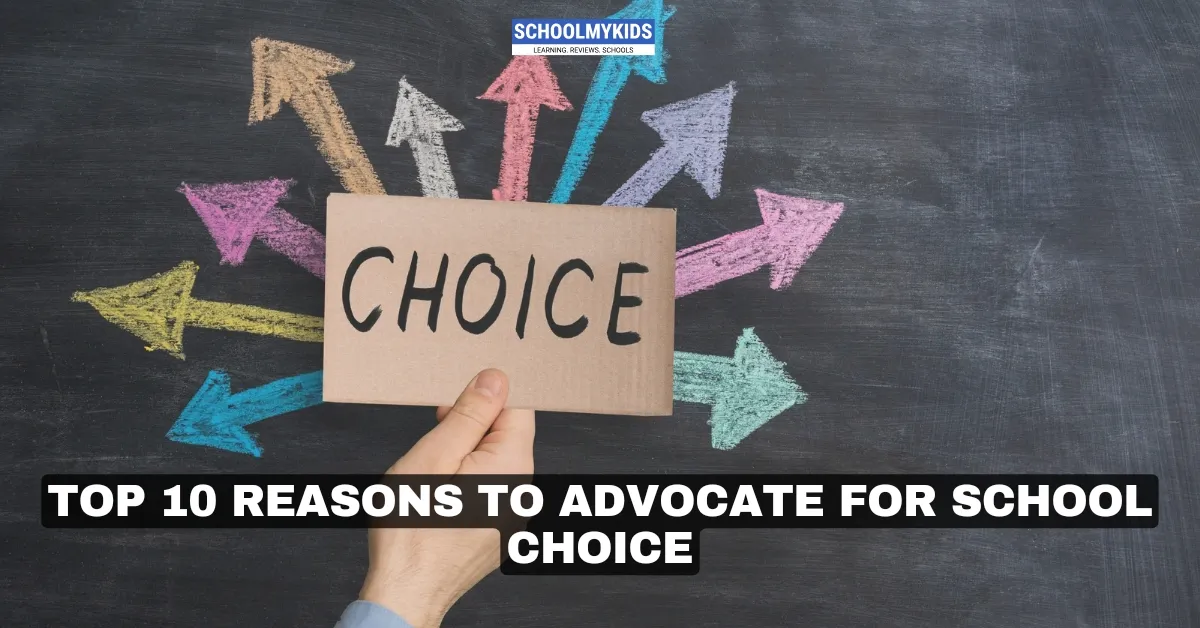The debate around school choice has gained significant traction over the past few decades as more parents, educators, and policymakers have pushed for reforms in the education system. School choice empowers families to select the best educational setting for their children, whether it be public, private, charter, magnet, or homeschooling. Advocating for school choice means supporting a system where education is tailored to the needs of individual students rather than enforcing a one-size-fits-all model.
Top 10 reasons to advocate for school choice
Here are the top 10 reasons to advocate for school choice.
1. Empowers Parents to Make the Best Decision for Their Children
At the heart of school choice is the idea that parents know their children best. Every child has unique strengths, weaknesses, interests, and learning needs, and a traditional public school may not always be the best fit for every student. Advocating for school choice ensures that parents have the freedom to select a school that best aligns with their child’s educational needs, personal values, and long-term goals.
In a system without school choice, parents often have no say in where their children are educated, as public school assignments are typically determined by geographic location. School choice policies, on the other hand, give parents the flexibility to choose from a variety of educational options.
2. Promotes Educational Equity
Many students, particularly those in low-income communities, are assigned to underperforming schools simply based on where they live. School choice provides these students access to higher-quality education opportunities that may not have been available otherwise. For families trapped in underfunded or failing school districts, choice programs—such as vouchers, charter schools, or tax-credit scholarships—can open doors to better learning environments and brighter futures.
By allowing students to attend schools outside of their assigned district, school choice creates more equitable opportunities for success regardless of socioeconomic status or neighborhood.
3. Encourages Innovation and Specialization
When schools must compete for students, they are incentivized to innovate and specialize to meet the diverse needs of their communities. Charter schools, for instance, are often given more autonomy than traditional public schools, allowing them to experiment with different teaching styles, curricula, and educational models. This flexibility fosters a culture of innovation, where schools develop unique approaches to education that may better serve students with varying learning styles or interests.
For example, some schools may specialize in STEM (Science, Technology, Engineering, and Math), while others focus on arts, languages, or vocational training. These specialized programs allow students to pursue their passions and develop skills tailored to their future career aspirations.
4. Improves Academic Outcomes
Studies have shown that school choice can lead to improved academic outcomes for students. For example, many charter schools and voucher programs have been linked to higher graduation rates, increased college enrollment, and better performance on standardized tests. When students are placed in environments that suit their learning styles and academic needs, they are more likely to thrive.
Moreover, the competitive nature of school choice often motivates both public and private schools to improve their performance to attract and retain students. This competition can result in higher standards and more rigorous academic programs across the board, benefiting all students.
5. Increases Student Engagement and Satisfaction
When students are placed in an educational setting that aligns with their interests, learning preferences, and goals, they are more likely to be engaged and invested in their education. School choice allows students to attend schools that offer specialized programs or curricula that they are passionate about, whether it be a focus on the arts, sports, technology, or science.
Additionally, when students feel that they have a say in their education, they are more likely to take ownership of their learning experience. Increased engagement can lead to better academic outcomes, improved attendance, and a greater sense of satisfaction with their educational journey.
6. Provides Access to Safer Learning Environments
School safety is a growing concern for many parents, and the ability to choose a school based on its safety record or policies is a significant reason to advocate for school choice. In communities where public schools face challenges related to bullying, violence, or a lack of resources to maintain safe environments, school choice gives parents the option to move their children to schools where they feel their child will be safer.
Whether a family is looking for a smaller class size, stricter disciplinary policies, or more comprehensive mental health support, school choice enables parents to select a school that meets their safety concerns.
7. Enhances Teacher and School Accountability
When families have the freedom to choose, schools and teachers become more accountable to students and parents. In a traditional system where students are assigned to schools based on location, there is often less incentive for schools to address parental concerns or improve performance. However, when families can opt to leave for another school, it motivates schools to listen to parents, address issues, and continuously seek improvements.
School choice fosters a system where schools must work harder to retain students by providing quality education, responsive customer service, and a positive learning environment. This increased accountability benefits not only the students who choose to stay but also the school as a whole, as it creates a culture of continuous improvement.
8. Promotes Diversity and Inclusion
School choice can help promote diversity and inclusion by breaking down the barriers associated with residential segregation. In traditional public school systems, students often attend schools within their district, leading to racial and socioeconomic segregation based on neighborhood demographics. By allowing students to attend schools outside of their assigned areas, school choice helps create more diverse student bodies.
Diverse schools offer students the opportunity to interact with peers from various cultural, ethnic, and socioeconomic backgrounds, promoting greater understanding and tolerance. These interactions can be invaluable in preparing students for life in a diverse and globalized world.
9. Fosters Personalized Learning
In an education system dominated by large class sizes and standardized testing, personalized learning is often difficult to achieve. However, school choice gives families the ability to select schools that offer more individualized attention and tailored learning experiences. Whether through smaller class sizes, differentiated instruction, or specialized curricula, personalized learning environments are more likely to meet the unique needs of each student.
For students who may struggle in traditional settings—such as those with learning disabilities, gifted students, or those who require additional academic support—school choice offers access to schools that can provide the necessary resources and personalized attention to help them succeed.
10. Supports Economic Growth and Competitiveness
A well-educated population is essential for a nation’s economic growth and competitiveness in the global market. School choice plays a role in developing a more skilled and capable workforce by allowing students to pursue educational programs that align with their career interests and strengths. For example, students attending vocational schools or specialized STEM programs may be better prepared for the job market and contribute more effectively to the economy.
Additionally, by fostering competition and innovation, school choice encourages all schools to improve their educational offerings, ultimately raising the quality of education across the board. A stronger education system leads to a better-prepared workforce, which can boost economic productivity and competitiveness on a national and global scale.
Conclusion
School choice empowers parents and students by providing a variety of educational options that meet their unique needs, preferences, and circumstances. Whether it's about accessing better schools, ensuring safety, fostering innovation, or personalizing learning, school choice offers numerous benefits that can improve the quality of education and student outcomes. Advocating for school choice is about promoting fairness, equity, and the right of every child to access the best possible education. As more families seek flexibility and autonomy in their children's education, school choice will continue to be a crucial part of the conversation around educational reform.









Be the first one to comment on this story.